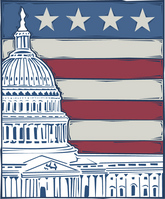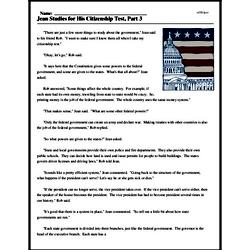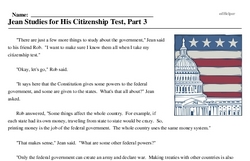Jean Studies for His Citizenship Test, Part 3
"There are just a few more things to study about the government," Jean said to his friend Rob. "I want to make sure I know them all when I take my citizenship test."
"Okay, let's go," Rob said.
"It says here that the Constitution gives some powers to the federal government, and some are given to the states. What's that all about?" Jean asked.
Rob answered, "Some things affect the whole country. For example, if each state had its own money, traveling from state to state would be crazy. So, printing money is the job of the federal government. The whole country uses the same money system."
"That makes sense," Jean said. "What are some other federal powers?"
"Only the federal government can create an army and declare war. Making treaties with other countries is also the job of the federal government," Rob replied.
"So what powers are given to the states?" Jean asked.
"State and local governments provide their own police and fire departments. They also provide their own public schools. They can decide how land is used and issue permits for people to build buildings. The states govern driver licenses and driving laws," Rob told Jean.
"Sounds like a pretty efficient system," Jean commented. "Going back to the structure of the government, what happens if the president can't serve? Let's say he or she gets sick or dies."



